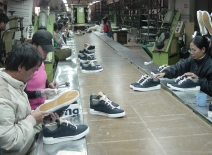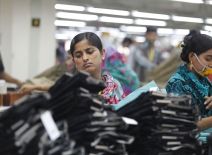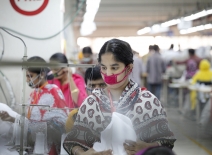
Anti-Slavery Day came about through an Act in the UK Parliament in 2010.
It designated 18 October every year as a day to acknowledge that millions of men, women and children continue to be victims of slavery, depriving them of basic human dignity and freedom.
The Day also aims to raise awareness among young people and others of the dangers and consequences of slavery. It encourages them to be active in the fight against it. And it draws attention to the progress made by government and others, and to what more needs to be done.
I’m not a huge fan of special days of the year that highlight issues which should hold our attention every day of the year. Nevertheless, I welcome the opportunity to reflect on the challenges of how labour abuse and exploitation, forced labour, modern slavery and human trafficking manifest in our world today - especially in global supply chains. This is also a moment to reflect on what can be done about them.
Modern slavery is a complex problem. There are no simple solutions. But we can learn some important lessons from studying what works and what doesn’t.
What works? Five lessons come to mind.
- Governments must ‘walk the talk’ and put their own house in order. Sanctions are powerful, but recognise the risk of unintended consequences.
- Transparency is also a key driver for corporate action but cannot achieve much on its own.
- Some company initiatives to tackle modern slavery have been proven to be effective but compliance driven top-down strategies will never deliver lasting change.
- International organisations and partnerships are critical components of any strategy to combat modern slavery but should focus precious time and energy on the right things.
- Workers are not just victims, they are rights holders, and but can themselves be the most important agents of change.
I’ve written 5 mini blogs that reflect my experiences and insights from working on these issues over the past decade. I propose some changes to the actions taken by governments, companies, international organisations and workers themselves.
You can read the mini blogs below! Each is based on a LONG READ article reflecting on UK Anti-Slavery Day. Read the full article here.
A word from Dame Sara Thornton, Independent Anti-Slavery Commissioner: “We are all much closer to modern slavery and human trafficking than we think – from the goods we buy to the services we use. Companies in scope of the Modern Slavery Act’s reporting requirements must produce statements on what they are doing to prevent trafficking and slavery from taking place in their organisations and supply chains. These minimal requirements are still not being met by all companies in scope, and this is simply not good enough.
Producing a modern slavery statement is the first step, but companies must go beyond a tick-box approach and ask themselves: what they are doing to map the risks in their global supply chain? I want to encourage compliance, share best practice where companies are taking innovative approaches to meet their responsibilities, and to also raise awareness with consumers who have a crucial role to play by thinking about social sustainability, as well as environmental sustainability.
I look forward to continuing working with Ethical Trading Initiative to support business to tackle the complex challenges of global supply chains.”
Modern slavery – what helps?

Thoughtful partnering and the need to add value

Lessons on government action and what more is needed

Workers as agents of change

Transparency drives better information and corporate accountability

